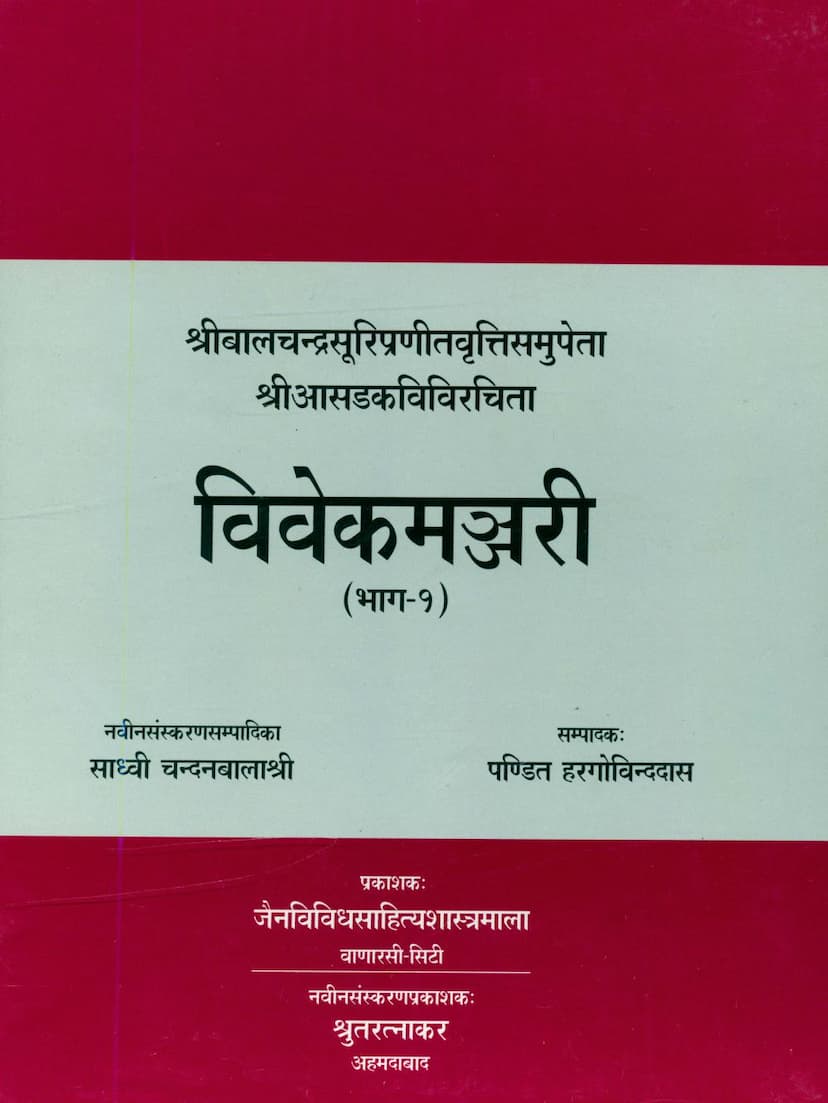Vivek Manjari Part 01
Added to library: September 2, 2025

Summary
Here's a comprehensive summary of the provided Jain text, "Vivek Manjari Part 01," based on the pages you'pasted:
Book Title: Vivek Manjari (Part 01) Author(s): Shrimad Aasdakavi (original text), Shribalchandrasuri (commentary) Editors/Publishers: Sadhvi Chandanbalashreeji (New Edition Editor), Pandit Hargovinddas (Editor), Jain Vividh Sahitya Shastramala (Publisher), Shrutratnakar (New Edition Publisher)
Overview:
Vivek Manjari, authored by the renowned poet Aasdakavi (circa 1248 VS) and annotated by Acharya Shribalchandrasuri (circa 1277 VS), is a significant Jain text composed in Prakrit verse. The book is presented in a new edition with a commentary in Sanskrit. It is dedicated to the virtuous memory of Param Pujya Jambu Vijay Maharaj.
Key Themes and Content:
The primary aim of "Vivek Manjari" is to elucidate the path to liberation (moksha) through the cultivation of wisdom (vivek) and purity of mind (manah-shuddhi).
-
The Importance of Vivek and Manah-Shuddhi: The text emphasizes that Vivek (wisdom/discernment) is like the supreme eye and an unconditional friend for all beings. However, Vivek alone is insufficient; it must be adorned with Manah-Shuddhi (purity of mind). Just as a flower bud enhances a tree's beauty and promises future fruit, Manah-Shuddhi enhances Vivek and leads to the fruits of heaven and liberation.
-
Four Pillars of Manah-Shuddhi: The book details four fundamental principles for achieving Manah-Shuddhi:
- Acceptance of the Four Refuges (Chatuh-sharana Pratipatti): This involves taking refuge in the four supreme beings: Arihants (liberated souls who have conquered passions), Siddhas (perfected souls), Sadhus (monks and nuns), and the Dharma (teachings of the Tirthankaras) as revealed by the Kevalis (omniscient beings).
- Appreciation of Virtues (Guna Anumodana): This involves the sincere appreciation and admiration of the noble qualities possessed by great souls, including Tirthankaras, Gandharas (chief disciples of Tirthankaras), Chakravartis (universal emperors), Baladevas, and other virtuous individuals.
- Repentance for Wrongdoings (Dushkrit Garha): This involves sincere remorse and condemnation of one's past mistakes and sins.
- Meditation/Contemplation (Bhavana): This refers to the practice of various meditative disciplines, particularly the Twelve Bhavanas (contemplations), which are crucial for spiritual progress.
-
Detailed Narratives and Examples: The bulk of Part 1 of Vivek Manjari is dedicated to illustrating these principles through compelling narratives from Jain tradition. These stories serve as practical examples of how various individuals, through their conduct and devotion, achieved spiritual heights or faced consequences for their actions. Some of the prominent narratives covered include:
- Bharat Chakravarti: His righteous rule, adherence to Dharma, and eventual renunciation.
- Bahubali: His strength and commitment to vows.
- Sunatskumar: His detachment from worldly pleasures.
- Gaj Sukumar: His suffering and eventual liberation.
- Dhundhan Kumar: His exemplary conduct.
- Sthulabhadra: His adherence to difficult vows and overcoming worldly temptations, including the story of Koshā the courtesan.
- Drudhaprahari: His intense penance and spiritual fortitude.
- Skandakacharya: His devotion and the tragic events involving his disciples.
- Chilati Putra: His spiritual journey despite adverse circumstances.
- Avanti Sukumar: His encounter with a jackal and the lessons learned.
- Meghakumar: His karmic journey and eventual liberation.
- Pundarik: His devotion and spiritual discipline.
- Dasharnabhadra: His devotion and adherence to vows.
- Prasannachandra Rajarshi: His wisdom and spiritual practice.
- Kuragaddul/Kuragaddaka: His extraordinary forbearance and the resulting liberation.
- Abhayakumar: His intelligence, compassion, and spiritual growth through various life stories and the concept of different types of knowledge (Naiyyayiki, Parinamiki, etc.).
- Jambu Swami: His supreme renunciation and spiritual attainment.
- Vishnu Kumar: His detachment and spiritual quest.
- Annika Putra: His virtuous life and devotion.
- Nagdatt: His story highlighting the consequences of attachment and the path to liberation.
- Nandishen: His experience with penance and the illusory nature of worldly attachments.
- Karakandukatha: His extraordinary penance and the miraculous events surrounding it.
- Vajraswami: His unwavering devotion and spiritual strength, even when facing extreme hardship.
- Keshi: His debate with King Pradeshi and the establishment of Jain principles.
-
Commentary by Shribalchandrasuri: The commentary provides detailed explanations of the Prakrit verses, elucidates complex philosophical concepts, and includes numerous illustrative stories (episodes) from Jain scriptures and traditions to make the teachings more accessible and impactful.
-
Editorial Contributions: The new edition, edited by Sadhvi Chandanbalashreeji, highlights her meticulous work in compiling, researching, and preparing the text, including identifying the sources of quotations. Pandit Hargovinddas is credited for his editorial and research contributions. The publication is supported by various Jain organizations and individuals, reflecting a community effort in preserving and disseminating Jain literature.
Significance:
"Vivek Manjari" serves as a guide for spiritual aspirants, offering profound insights into the nature of reality, the path of renunciation, and the means to attain ultimate bliss. The elaborate narratives and the insightful commentary make it a valuable resource for understanding Jain philosophy and practice. The book is considered essential reading for anyone seeking spiritual upliftment and knowledge.